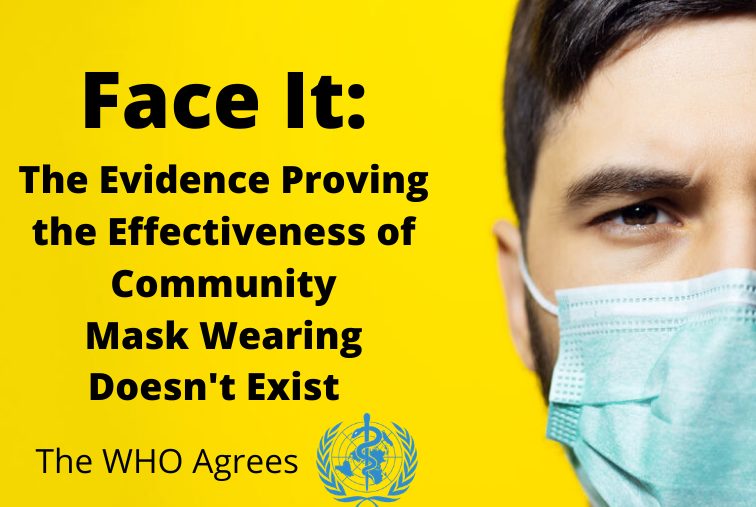
I henhold til dens "Advice on the use of masks in the community, during home care and in healthcare settings in the context of the novel coronavirus (2019-nCoV) outbreak: interim guidance, 29 January 2020":
"Brug af medicinske masker, når det ikke er indikeret, kan medføre unødvendige omkostninger, anskaffelsesbyrde og skabe en falsk følelse af sikkerhed, der kan føre til at forsømme andre væsentlige forhold, såsom håndhygiejne."WHOs råd inkluderer faktisk en advarsel om, at forkert brug af masker endda kan øge risikoen for transmission i forbindelse med forkert brug og bortskaffelse af masker."
Kommentar: Delvist oversat af Sott.net fra Even the WHO acknowledges that scientific evidence of effectiveness of wearing masks in community settings is NON-EXISTENT
Given that cities throughout the United States are now requiring the use of "face masks," the following very stringent recommendations would need to heeded for them to provide any theoretical benefit:
- Place mask carefully to cover mouth and nose and tie securely to minimise any gaps between the face and the mask
- While in use, avoid touching the mask; - remove the mask by using appropriate technique (i.e. do not touch the front but remove the lace from behind)
- After removal or whenever you inadvertently touch a used mask, clean hands by using an alcohol-based hand rub or soap and water if visibly soiled.
- replace masks with a new clean, dry mask as soon as they become damp/humid
- Do not re-use single-use masks
- Discard single-use masks after each use and dispose of them immediately upon removal.
- Cloth (e.g. cotton or gauze) masks are not recommended under any circumstance.
In exceptionally humid places like Florida, where do-it-yourself face masks made of cotton are not uncommon, the recently announced executive order in cities like Miami requiring everyone where masks in public spaces which does not qualify the type or proper use of these masks could be contributing to worsening the crisis, according to the WHO's presumably authortative and well-researched guidelines.
The Evidence For the Effectiveness of Wearing Masks Does Not Exist
An article published in The Sun titled, "FACE IT: Face masks can 'increase risk' of catching coronavirus - how to protect yourself," interviewed an infection prevention specialist by the name of Elie Perencevich, a professor of medicine and epidemiology at the University of Iowa's College of Medicine, who stated:
"Masks won't protect the average person because they will wear them incorrectly and autocontaminate themselves."Indeed, meta-analyses of clinical research into use of face masks for the transmission of viruses that present with clinical similarity to COVID-19, such as influenza, have found little evidence in support of the effectiveness of such an intervention.
Prof Perencevich added: "I've never seen a person practice hand hygiene before removing a mask in public and then after removing the mask."
He told Forbes that the average healthy person does not need to have a mask.
"There's no evidence that wearing masks on healthy people will protect them," he said. "They wear them incorrectly, and they can increase the risk of infection because they're touching their face more often."
A 2010 review, publishing in the journal Influenza and Other Respiratory Conditions titled, "REVIEW Face masks to prevent transmission of influenza virus: a systematic review," found little supporting evidence:
"In conclusion there remains a substantial gap in the scientific literature on the effectiveness of face masks to reduce transmission of influenza virus infection. While there is some experimental evidence that masks should be able to reduce infectiousness under controlled conditions, there is less evidence on whether this translates to effectiveness in natural settings. There is little evidence to support the effectiveness of face masks to reduce the risk of infection."



Kommentar: That may be true, but what better way to signal one's subservience to the new police state: